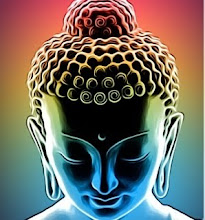
As a newcomer to the study of dharma, one of the concepts I have struggled with the most is the notion of rebirth.
We are told that rebirth is like lighting a candle. Just before a candle burns out, one can light a new candle with the flame from the dying candle. The first flame then dies out and the other one grows strong. They are not the same flame, but it is the energy from the former that brings the latter to life. So it is, we are told, with rebirth. Although there is no unified "self" to be reborn (see yesterday's post), there is a certain continuity between one life and the next, a migration of energies from one to the other.
"But wait," I say, "what is it that is reborn? What is it that continues from one life to the next?"
Clearly, the body, the physical organism that we think of as "self," dies with us. It is cremated or decomposes, and is reconstituted into the environment. So, the body (rupa) is not reborn.
Our feelings and sensations (vedana), the sensory data gathered by our eyes, ears, nose and other sense organs, must also cease when the body dies. When the switch is flipped, the lights go out, and no there is no more data input for the mind to receive. So, vedana is not reborn.
Perhaps it is our thinking mind (samjna), the mechanism by which sensations become ideas, that is reborn. Without rupa and vedana, samjna is like a disembodied head, incapable of doing anything. So it seems that it is not our thinking, conceptualizing mind that is reborn.
What about vijnana, consciousness? This is what most of us think of when we think of our sense of "self." When something goes bump in the night, it is consciousness that says, "Hey, there's something out there." The ears (vedana) pick up the sound, the thinking mind (samjna) registers it, and consciousness identifies it as something beyond the body (rupa). Could it be consciousness that is reborn?
But what about the last thread in the strand: samskara, our habit energy, our motivations and volitions? It is samskara that gives our actions karmic significance. Without motivation or volition, an action may create ripples, but it does not resonate with karma. It is karma that follows us from the moment of our birth to the moment of our last breath, and even beyond. It therefore must be samskara that survives the death of the physical body, since it is to samskara that karma attaches.
...
Or so many teachers have taught.
But perhaps it does not matter what is reborn. Zen Masters like Seung Sahn would say there is no use arguing about such things that cannot be known. Accept it with a "don't know mind," they would say. They say it is best to give up such intellectual pursuits, wake up and let go of samsara and worldly suffering by living in accordance with the Eighthold Path and the Precepts. Perhaps they are right that I could make better use of my mental energies to practice mindfulness and selflessness, rather than get tangled up in the thicket of Buddhist logic and cosmology.
Namaste.

1 comment:
I get the feeling that some of the more difficult philisophical ordinances of Buddhism like reincarnation are beyond my understanding because I have not been exposed to them consistently since childhood. My experience is on a different plane of thought. However, I still can understand the basics of Buddhism and can apply Buddhist practices to my life. As I go, however, (and this is my point), I understand more and more the unfamiliar concepts of Buddhism. For the most part, they seem to be truths which can be realized eventually by anyone on a spiritual path, and so I hope they will fall into place for me as well.
Post a Comment